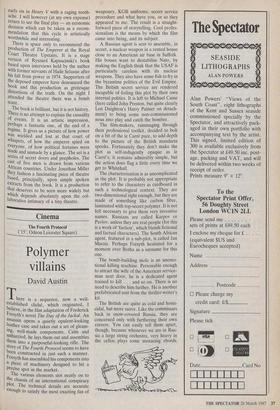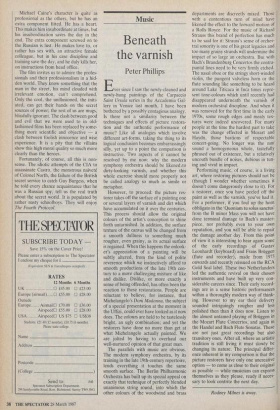Cinema
The Fourth Protocol ('15', Odeon Leicester Square)
Polymer villains
David Austin
There is a sequence, now a well- established cliché, which originated, I believe, in the film adaptation of Frederick Forsyth's novel The Day of the Jackal. An assassin opens a quietly opulent-looking leather case and takes out a set of gleam- ing, well-made components. Calm and unhurried, he lays them out and assembles them into a purposeful-looking rifle. The story of The Fourth Protocol seems to have been constructed in just such a manner. Forsyth has assembled his components into a piece of machinery designed to hit a precise spot in the market. The various elements slot neatly on to the chassis of an international conspiracy plot. The technical details are accurate enough to satisfy the most exacting fan of weaponry, KGB uniforms, secret service procedure and what have you, or so they appeared to me. The result is a straight- forward piece of storytelling. Cool profes- sionalism is the means by which the film came into being, and its subject.
A Russian agent is sent to assemble, in secret, a nuclear weapon in a rented house close to an American air base in Suffolk. His bosses want to destabilise Nato, by making the English think that the USAF is particularly careless with its nuclear weapons. They also have some fish to fry in the byzantine politics of the Evil Empire. The British secret service are rendered incapable of foiling this plot by their own internal politics. It is left to Michael Caine (here called John Preston, but quite clearly Len Deighton's Harry Palmer on detach- ment) to bring some non-commissioned nous into play and catch the bomber. The film-makers, rummaging through their professional toolkit, decided to bolt on a bit of the le Cane pace, to add depth to the picture of the British mandarin spooks. Fortunately they don't make the plot as self-indugently opaque as le Cane's; it remains admirably simple, but the action does flag a little every time we get to Whitehall.
The characterisation is as uncomplicated as the plot. It is probably not appropriate to refer to the characters as cardboard in such a technological context. They are two-dimensional right enough, but they are made of something like carbon fibre, laminated with top-secret polymer. It is not felt necessary to give them very inventive names. Russians are called Karpov or Pavlov, unless they are real people (for this is a work of 'faction', which blends fictional and factual characters). The South African agent, featured in a sub-plot, is called Jan Marais. Perhaps Forsyth hesitated for a moment over Botha as a surname for this one.
The bomb-building mole is an unemo- tional killing machine. Personable enough to attract the wife of the American service- man next door, he is a dedicated agent trained to kill . . . and so on. There is no need to describe him further. He is another prefabricated unit from the thriller-writer's kit.
The British are quite as cold and homi- cidal, but more suave. Like the commissars back in snow-covered Russia, they are concerned only with furthering their own careers. You can easily tell them apart, though, because whenever we are in Rus- sia a large string orchestra, very heavy in the cellos, plays some menacing chords. Michael Caine's character is quite as professional as the others, but he has an extra component fitted. He has a heart. This makes him insubordinate at times, but his insubordination saves the day in the end. The extra component screwed on to the Russian is lust. He makes love to, or rather has sex with, an attractive female colleague, but in his case discipline and training save the day, and he duly kills her, on instructions from head office.
The film invites us to admire the profes- sionals and their professionalism in a hid- den world. They know something that the man in the street, his mind clouded with irrelevant emotion, can't comprehend. Only the cool, the unillusioned, the initi- ated, can get their hands on the secret sources of power; the rest of us are mugs, blissfully ignorant. The clash between good and evil that we were used to in old- fashioned films has been replaced by some- thing more scientific and objective — a clash between foolish innocence and wise experience. It is a pity that the villains show this high moral quality so much more clearly than the heroes.
Fortunately, of course, all this is non- sense. The idiotic attempts of the CIA to assassinate Castro, the monstrous naiveté of Colonel North, the failure of the British secret service to catch Guy Burgess, when he told every chance acquaintance that he was a Russian spy, tell us the real truth about the secret world. It is populated by rather nasty schoolboys. They will enjoy The Fourth Protocol.



















































 Previous page
Previous page